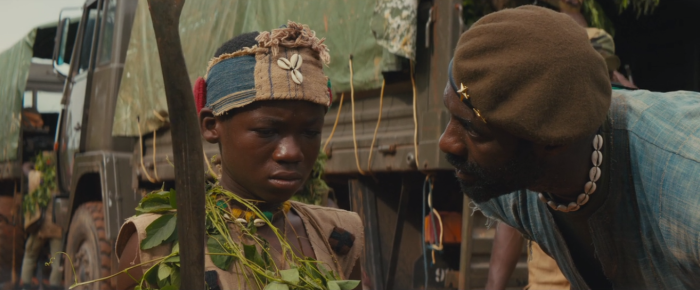Director: Cary Fukunaga / Starring: Abraham Attah, Idris Elba, Emmanuel Nii Adom Quaye / Writer(s): Uzodinma Iweala(novel), Cary Fukunaga
Beasts Of No Nation is a drama about a young boy's story of survival as child soldier in a war-torn unnamed West African country, based on a novel of the same name by Uzodinma Iweala.
The film starts out with a voice-over of 12-year-old Abu(Abraham) telling us about his current life and his family, but learn nothing about the war between Abu's government and the NDF rebels, just that they're warring and there's some paranoia about it in his community. The war reaches his village and Abu is torn from his family and everything he loves. With almost no time for grief, he's immediately forced to go into survival mode. A rebel leader only known as Commandant (Elba) & his faction happen upon Abu and offer him an invitation to join them in their battle against the army. Abu joins knowing it's either be a rebel or die. He's trained, initiated then quickly dropped onto the front line of the war.
Abu is taken under the wing of Commandant along with another boy, a mute named Striker. They bond over a shared victimization from the Commandant whom Elba plays as charismatic, woeful and meditative. You naturally wonder about man who leads children into war, but despite that he still doesn't come off as the type of savage beast you'd expect these actions from. He's best part of the film by far, but his character sadly isn't delved into. He's not redeemable by any means, but he is humanized. You can tell he genuinely believes in what he's doing. He's a cog in the machine, not the driving force.
Abu's journey of survival plods along from one act of violence to the next until it feels like only a matter of fact. Abu is a boy who having only spent 12 years walking the earth and is forced to do things not even men should be doing. He's hurled into a world of darkness, but it's bittersweet because the film is shot so beautifully by Fukunaga yet so many horrible things are happening. It's harrowing, but majestic imagery. Sometimes it works well syncing up with the contrast of Abu and the other child soldiers still behaving like children in the midst of all these violent acts they're ordered to do. But it ultimately feels wrong.
That fact this film takes place in an unnamed African country is simultaneously detrimental and beneficial to audience's perception of it's narrative. Though there is a little political subtext to it, this film is not about the tragic wars that take place in African countries, it's about a boy's journey in a war and how it threatens to dehumanize him, the backdrop doesn't matter as much as the story period. The anonymity of the country helps the viewer focus on the protagonist, but it could also lead to those who are uneducated having a blanketed perception about the continent. I hope it leans more to the former.
Even with everything he does, it's still hard to buy him transitioning into a heartless soldier. Maybe that's the intent considering he's still only a boy. But it feels muddled in the end as it amounts to a conclusion that feels a little unlikely. I know of similar real-life narratives that have ended this way so maybe I should instead say it just feels too neat for what kind of film this is.
It feels similar to Fukunaga's first film Sin Nombre. That film is just as brutal and bleak, but handled with more delicacy. This is a story of survival as well Sin Nombre, but where that film ends on a note of promise, this ends feeling kind of indifferent and ultimately pointless. There's suffering, loss, more suffering and then what? Still, it's a good film, but not great. It's a heartbreaking and visceral experience, just it doesn't have a strong impact outside of that.

No comments:
Post a Comment